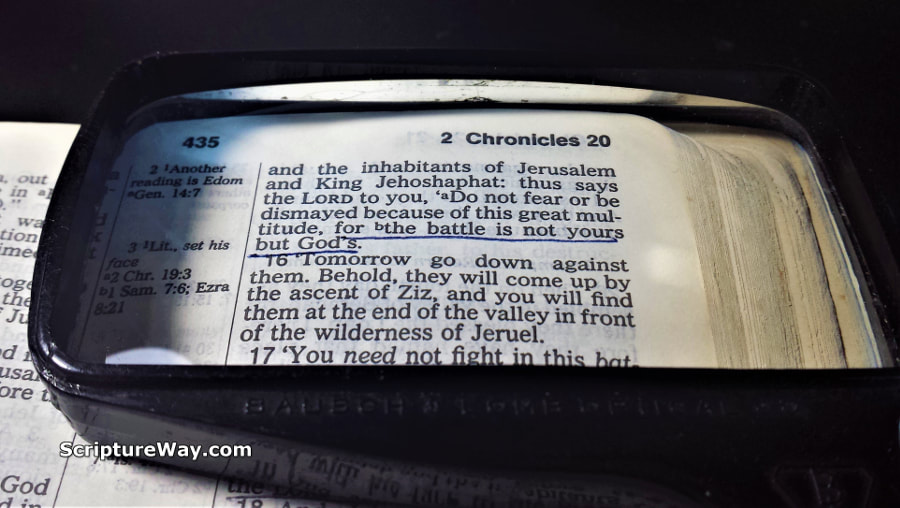This lesson explains biblically what it means to commit one's "way" to the Lord. The verses below are taken from the New American Standard Bible (NASB 1995 version) unless noted otherwise (Ref. 1).
Consider. In the context of trusting in the Lord, what do you think David had in mind when he wrote, "Commit your way to the Lord"? (Psalm 37:5)
Introduction
David wrote Psalm 37 about the security of those who trust in the Lord (see the heading for Psalm 37:1-6). In Psalm 37:3, David tells us, "Trust in the Lord and do good; Dwell in the land and cultivate [feed on] [God's] faithfulness" (Ref. 2, brackets added). To "trust" in the Lord means to be confident, sure, and secure in the Lord (Strong's Exhaustive Concordance - Ref. 3).
Commit your way to the Lord
In Psalm 37:5, the scripture instructs us to "Commit your way to the Lord." Let's look into the word meanings for "commit" and "way" in this phrase.
a. The Hebrew word translated as "commit" literally means to "roll" or "roll away" (Ref. 4, Genesis 29:10). The idea is for a person to roll or roll away a large stone (figuratively, a burden) which is too heavy for them to bear from themself onto the Lord, imploring his help (Ref. 5). b. The Hebrew word derek translated as "way" in Psalm 37:5 has both a literal and a figurative meaning. Derek literally means way, road, distance, journey, or manner (Ref. 6). Figuratively, derek means our entire course or journey of life (Brown-Driver-Briggs -- Ref. 6). When we confidently commit our "way" to the Lord, we entrust him with our life's journey including all of our cares, burdens, plans, and business. Similar verse:
Trust also in Him
Committing your way to the Lord and trusting in him go hand in hand. Trusting in the Lord means putting your confidence in him (Ref. 3). When we roll our life's journey, and all that weighs on us, on him, we have confidence that our life is in good hands (Ref. 8).
Similar verses:
And He will do it
The Hebrew verb translated in Psalm 37:5 NASB as "will do it" means literally to do or make, and more broadly, to accomplish (Ref. 10). The English Standard Version translates this phrase as "He will act" (Psalm 37:5 ESV). The King James Version translates this phrase as "He shall bring it to pass" (Psalm 37:5 KJV).
When we roll our life's journey, and all that weighs on us onto our Lord Jesus, we have confidence and are sure that he will act and that he will guide us in the way that he determines is good (Romans 8:28, Proverbs 16:9).
Apply. Every day, in prayer, commit yourself and your way to the Lord Jesus. Ask him and seek his direction for your life, that you may walk in the purpose he has for your life (Matthew 7:7). Ask him to give you wisdom for your plans and decisions (James 1:5). Trust him to provide for your needs in accordance with his will (Philippians 4:19, 1 John 5:14). Cast your worries and burdens onto him (1 Peter 5:7 NIV). Confidently know that the Lord Jesus will act in your behalf (Psalm 37:5). He will bring to pass what is good for you according to his purpose (Romans 8:28).
Thank the Lord and praise him for his answers to your prayers (Philippians 4:6 TLB). Tell others, with gratitude and humility, what God has done for you (Psalm 66:16). Your witness will encourage other people to commit their way to the Lord.
Related Lessons
"About the Way" - John 14:6 "The Way of the Lord (Old Testament)" - Deuteronomy 5:33 "Cast All Your Anxiety on Him" - 1 Peter 5:7
References
1. https://www.biblegateway.com/versions/New-American-Standard-Bible-NASB1995/ 2. https://biblehub.com/commentaries/pulpit/psalms/37.htm Pulpit Commentary - Psalm 37:3 3. https://biblehub.com/hebrew/982.htm 4. https://biblehub.com/hebrew/1556.htm 5. https://biblehub.com/commentaries/poole/proverbs/16.htm Matthew Poole's Commentary - Proverbs 16:3 6. https://biblehub.com/hebrew/1870.htm 7. https://biblehub.com/hebrew/4639.htm 8. https://biblehub.com/commentaries/king-en/psalms/37.htm Kingcomments Bible Studies - Psalm 37:5 9. https://biblehub.com/hebrew/734.htm 10. https://biblehub.com/hebrew/6213.htm
3 Comments
"When I am afraid, I will put my trust in You. In God, whose word I praise, In God I have put my trust; I shall not be afraid. What can mere man do to me?" (Psalm 56:3-4)
"Trust and confidence in the Lord is the best antidote against fears" -- John Gill (1697-1771) (Ref. 1, Ref. 2).
Consider. On a scale from 1 to 10, with 10 being the highest, how would you rate yourself for trusting in God when you are afraid?
Biblical Background
David wrote Psalm 56 during one of the lowest points in his life. Saul, the king of Israel, was determined to kill David (1 Samuel 20:30-33). Even though Jonathan, Saul's son, and David were close friends, Jonathan advised David to flee from Saul (1 Samuel 20:41-42). David came to Nob to Ahimelech, the priest (1 Samuel 21:1). David lied to Ahimelech about the purpose of his visit (1 Samuel 21:2). David received from Ahimelech consecrated bread and the sword of Goliath (1 Samuel 21:6, 1 Samuel 21:9). David arose and "fled that day from Saul" to Achish king of Gath, a city in Philistine territory (1 Samuel 21:10, Ref. 3).
Gath was the home town of Goliath (1 Samuel 17:4). David had killed Goliath in battle (1 Samuel 17:41-49). David now had the sword of Goliath with him. The servants of Achish knew of David's reputation. "Is this not David the king of the land? Did they not sing of this one as they danced, saying, 'Saul has slain his thousands, And David his ten thousands'?" (1 Samuel 21:11). The scripture says "David took these words to heart and greatly feared Achish king of Gath" (1 Samuel 21:12). David then "disguised his sanity before them, and acted insanely" (1 Samuel 21:13). When I Am Afraid, I Will Put My Trust in You
Despite David's fear and troubled emotional state, David makes an astounding declaration about trusting in God when he was afraid. "When I am afraid, I will put my trust in You. In God, whose word I praise, In God I have put my trust; I shall not be afraid. What can mere man do to me?" (Psalm 56:3-4). David repeats his declaration of trust in Psalm 56:11, "In God I have put my trust, I shall not be afraid." Note the subtle change in tense from "I will put my trust" in verse 3 to "I have put my trust" in verse 11.
In the Hebrew, the word for "trust" means to be boldly confident, secure, and sure (Strong's Exhaustive Concordance - Ref. 4). When we trust in God, we are boldly confident, secure, and sure in him. David frequently wrote in the Psalms about trusting in God. For additional encouragement and strength on this topic, I suggest you read "29 Bible Verses About Trusting God" (Ref. 5). David recognized that the remedy -- the antidote -- for fear is to trust in God. David put his confidence in God and in God's care. Will you do the same? A related, closing verse for your consideration: "Do not fear, for I am with you; Do not be afraid, for I am your God. I will strengthen you, I will also help you, I will also uphold you with My righteous right hand." (Isaiah 41:10)
Apply. If you are fearful or afraid today, pray to God. Put your complete trust in God and the promises in his word (Psalm 56:3-4). God will strengthen you and help you (Isaiah 41:10). Thank God for his work in you to deliver you from your fear and for taking care of your concerns.
Suggested Listening. Listen to Alan Jackson's Official Music Video, "'Tis So Sweet to Trust in Jesus (Live)."
Related Lessons and Resources
"29 Bible Verses About Trusting God" - Psalm 56:3 "The Remedy for a Troubled Heart (John 14:1)" "'Fear Nots' of the Old Testament" - Isaiah 41:10
"Do not fear or be dismayed because of this great multitude, for the battle is not yours but God's." (2 Chronicles 20:15)
Purpose:
This article presents five steps to deal with our personal crises - steps that are scriptural, methodical, and effective. All of us at times either have faced or will face personal crises. Circumstances like this strike at the core of our being – physical, spiritual, and emotional. The Bible is a great comfort to us any time, but especially during difficult times - such as the times we are going through now. Step 1: Recall God's Promises
The first place to turn to is to the Bible. Get your attention off of your problem and on to God. Read and meditate upon God’s promises. This step has a vastly therapeutic effect.
"God is our refuge and strength, a very present help in trouble. 2 Therefore we will not fear though the earth gives way, though the mountains be moved into the heart of the sea, 3 though its waters roar and foam, though the mountains tremble at its swelling." (Psalm 46:1-3) For your encouragement, I have included links to 26 additional "promises passages" from God's word. You may see all of the verses listed below written out in just one click here (Ref. 1 - "Bible Verses for Times of Crisis"). God's promises verses: Deuteronomy 31:6; Joshua 1:9; Psalm 16:8; Psalm 23:1; Psalm 27:1; Psalm 34:4; Psalm 34:7; Psalm 55:22; Psalm 56:3-4; Psalm 68:19-20; Psalm 91:1-6; Psalm 103:1-5; Proverbs 3:5-6; Isaiah 26:3-4; Isaiah 40:31; Isaiah 41:10; Isaiah 43:2; Matthew 11:28; John 14:27; Romans 8:28; Romans 15:13; Philippians 4:6-7; Philippians 4:19; Hebrews 6:19; 1 Peter 5:6-7; Revelation 21:4. Read your Bible regularly, not just when you have a crisis. Memorize scripture verses. That way, when a crisis arises, you can immediately draw upon familiar, comforting words of scripture, and you will be well-equipped to deal with difficult situations when they occur (2 Timothy 3:16-17). Step 2: Trust in God Through Prayer
Prayer is an open conversation with God. Even a short prayer, "Help me," is long enough. Talk with God and ask him to take care of your problem. Trust God to act (Proverbs 3:5-6). Ask God to take care of your problem according to God's will, not your own (1 John 5:14-15). Trust that God is in control of the situation.
Step 3: Solicit Prayer Support from other Christians
Other Christians can bring you much encouragement by praying with you or for you. Share your need or concern with Christian friends, and ask for their prayers. When you are "down," others can pray from strength and lift you up. "Plug in" with one or more small groups of Christians, for example, a Bible study or prayer group, or a fellowship group. Small groups can provide you tremendous personal support (Matthew 18:19-20; Galatians 6:2; James 5:16).
Step 4: Believe that God Will Act
Keep the faith. Remember that you have prayed. Keep on praying. Don’t give up. Feed your faith, not your doubts. Whichever one you feed will grow (Luke 18:1-8; Mark 9:21-24; Psalm 37:5; Hebrews 11:1). God will do what he promises.
Step 5: Testify Publicly to the Results that God Provides
Tell others how God answers your prayers. By this, you will encourage other people. Jesus expects you to “go public” with your testimony about his work in your life – that God may be glorified (Matthew 10:32; Mark 5:18-20; Psalm 66:16, 1 Peter 3:15).
-------------------------------------
Praise God that God's word never passes away (Matthew 24:35)! We can always count on God to help us through difficult times. God's promises are true and everlasting. |
Daily Bible Verse
(Click the link above) Author
Mr. Whitney V. Myers. Christian. For more information, please visit the Author Page. Posting ScheduleI plan to provide new postings about once a month. Planned Topics(subject to change) Recent Posts(most recent three months) Popular Posts(top 10) Categories
All
Archives
March 2024
|
|
Copyright 2018-2024 Whitney V. Myers |
Listed in Feedspot's Top 100 Bible Study Blogs and Websites |



 RSS Feed
RSS Feed
